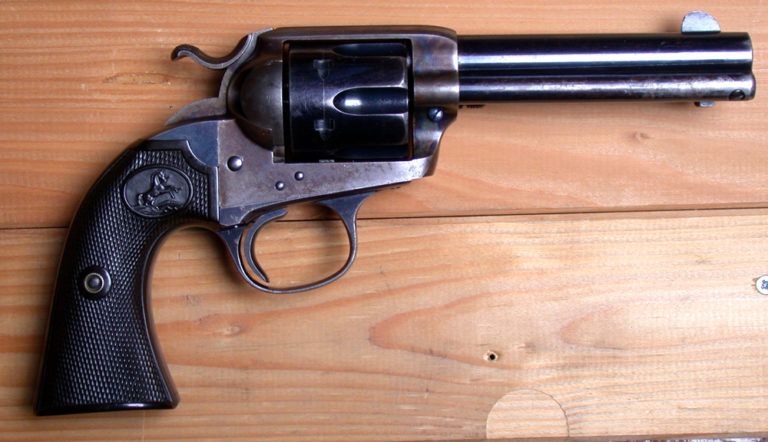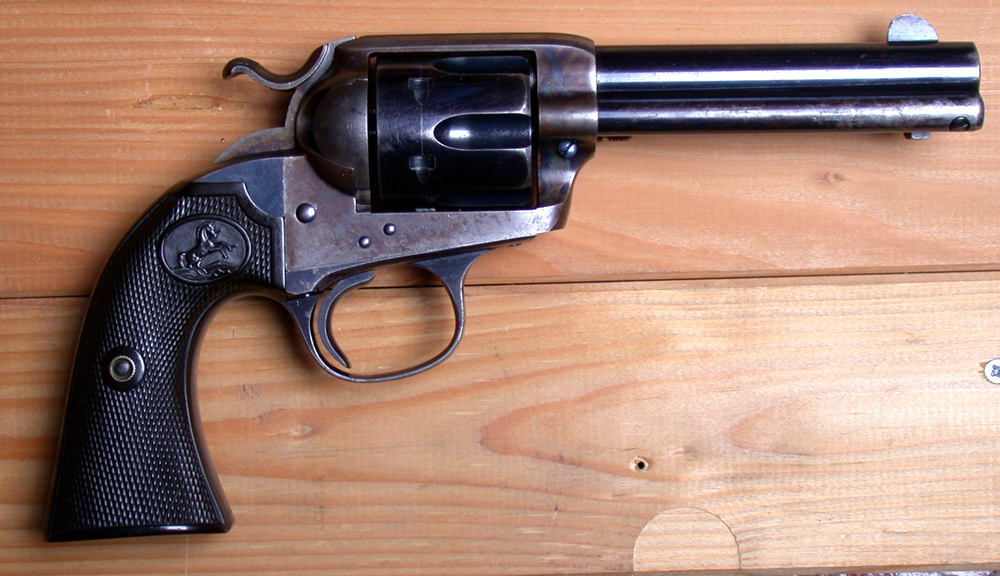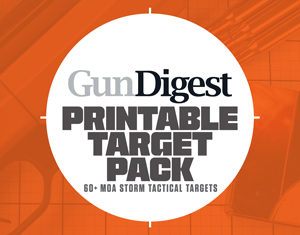

The 22-caliber sixguns and semi-auto pistols are useful for just one thing – target practice and competition. They may also be used effectively on very small game with high-speed hollow points occasionally. The 32-20 and 38 Special factory loads are far better small-game loads as a whole, but both lack power for any serious social purposes, for shooting game of any size, or for use against mean stock.
I have killed three mule deer with the 32-20 low-velocity smokeless soft-point load, and the cartridge proved entirely inadequate. I have also killed a couple of muleys with a K-22 S & W at close range, working on the backs of their heads double action. I had walked out on the edge of a small cliff and a big buck and a doe appeared just under me at about six yards range. A quick shot, double action, to the back of each head put both of them down, but each got up on its feet almost instantly. Two more shots were taken at each, and then the gun was empty. Both were down and kicking, but I had hardly reloaded when both were up again.
Then I started shooting at the back of the neck, just to the rear of the skull. When the gun was again empty, both were dead, but I will never try that stunt again. Another time, I had put two 172-grain 30-06 slugs in a big mule buck and he went down. Not wanting to shoot him up any more, I borrowed Jim Robbin's Colt Woodsman and proceeded to empty the gun in him. I hit the deer between the eyes with the first shot and heard the tiny slug whine as it ricocheted away. As the buck ran past, I put the rest of the magazine in close behind the shoulder. The buck went a couple hundred yards and again lay down. I approached to within 30 yards as he lay in the sagebrush watching me. I bounced most of another magazine off his skull before one bullet went through the tiny nerve hole over the left eye and killed him. No more 22's for me on anything bigger than bullfrogs, squirrels, or cottontails.
Contrary to popular opinion, the 32-20, 38-40, and 44-40 factory soft-point low-velocity loads will expand very well on deer and, if bones are struck, turn wrong side out. Yet the bullets will not expand in pine wood, simply smearing off the soft point and leaving the jacket intact. I wore out completely one 32-20 barrel with both factory loads and handloads in game shooting. I have also shot a 38-40 and a 44-40 a great deal. All three cartridges are bottlenecked and the chambers are much too long for the body of the case. When fired, the cases expand nearly to the mouth, leaving only about half of the original neck and requiring considerable resizing to reload them. I used to use No. 80 powder and the 260-grain 40-82 Winchester bullet sized down to fit in the 38-40.
The combination was superbly accurate from a 5 1/2-inch Single Action Colt, and a real killer on anything, but constant resizing made for short case life and I finally gave it up. The 44-40 is by far the best of these three rifle cartridges, and it was old-timer Ashley Haines' favorite sixgun load, but the 44-40 does its best work from a long 7 1/2-inch barrel owing to being loaded with rifle powder. I never could get much penetration with factory 38-40 or 44-40 loads from a sixgun, and soon came to prefer longer, heavier bullets that would give better penetration on stock or big game when the necessity for such use arose.
A factory 38-40 load almost cost me my life while monkeying with a wounded bull elk. The bullet simply splattered on the elk's skull, and did not penetrate. Had the cylinder not been loaded alternately with heavy black powder loads, that bull would have ended my hunting. With both cartridges, the case body is large and the neck short for short bullets. The charge must be held down religiously to safe pressures or it will bulge the bolt cuts in the cylinder.
My Preferences
I much prefer the 44 Special and the 45 Colt cartridges for sixgun use. For the handloader, the 44 Special is by far the best of all sixgun cartridges for serious work, either target, defense, or game killing. The cylinder walls are thicker over the case body than in the 45, and the cartridge is superbly accurate.
The old black powder loads with 250-, 255-, and 260-grain government bullets and 40 grains of FFG black powder gave 900 feet in the 45 Colt and would surely penetrate. I planted a 250-grain Remington black powder load in the seat of a goat's pants and it penetrated through to the left shoulder, which it broke. On broadside shots on both elk and goats, it went clean through unless heavy shoulder bones were hit. The 38-40 and 44-40 factory loads stopped under the skin on the off side on lung shots on elk. With the heavy 260-grain 38-40 handload, penetration was excellent.
Another 45 Colt load that gave excellent accuracy and penetration was the Winchester 300-grain 45-90 lead bullet sized down to .454 inch and backed by 35 grain of FFG. It killed mule deer and wounded elk well and was very accurate. I once had a case head separate with this load, blowing the loading gate out of the gun and cutting through the side of my trigger finger. That case had been reloaded many times, however, and the load was safe enough in good cases.
The factory 45 Colt pointed bullet punched a rather small hole through game and would not expand unless it hit a heavy bone. With that bullet I shot a great many grouse with little damage to the meat. In search of the best sixgun bullet, I designed a blunt-nosed bullet (No. 454260) for Belding & Mull but found that it or the same design worked out for the 44 Special in 260- and 280-grain was not accurate at any great range, so we dropped them and designed another bullet for Lyman.
First in 44 Special, 250-grain solid and 235-grain hollow base or hollow point, then in 45 Colt 250-grain, later in 45 semi-auto rim 240-grain, and still later in 173-grain solid and 160-grain hollow base or hollow point 38 Special, these Keith bullets have proven ideal, for me at least, for all sixgun work in twenty years of continuous use. They cut full caliber holes in anything and penetrate almost as well as the old pointed 45 Colt black powder load in solid persuasion. In hollow-point design, they will expand at velocities of 1,000 feet or more, and at 1,200 feet are very destructive to all game and ruinous to small game.
The Keith 160-grain 38 Special hollow point, backed by 13.5 grains of 2400, from the Colt Single Action or Shooting Master, or the S & W Heavy Duty or Outdoorsman will simply blow a grouse to bits and wings. The legs and neck will fly off at all angles when the bird is centered. The Keith 235-grain 44 Special hollow point, backed by 18.5 grains of 2400, is even worse in its destruction of living tissue.
It's certain death on either elk or deer if placed in the lungs broadside at close range, but it will not penetrate quite as well as the 250-grain solid in bone or when meaty portions of an animal are struck. Bob Hagel killed eight treed cougar last winter with a 44 Special 4 1/2-inch barrel Single Action Colt using these loads. He said the hollow point was much the best for a chest or lung shot and the solid bullet best for shoulder shots to break the big cats down so that they would not fall out of the tree full of fight.
I have tried both the Super 38's and the 9 mm Lugers on game, also the 45 semi-auto, for many years and they are one and all far inferior in actual knockdown power to the heavy revolver loads. A friend emptied a Super 38 Colt into a cougar's chest at close range in a tree, but the big cat jumped out and ran a short distance. One heavy 44 Special or 357 Magnum or 45 Colt in the same place would have done the business. Metal-patched bullets from the semi-auto pistols are simply not as good stoppers as are the soft lead bullets of the revolver, but the 45 Colt semi-auto has more actual shock on game than either the Luger or the Super 38. I have shot enough game with all three to prove the point, to my own satisfaction at least. Read Part 3 →

Next Step: Get your FREE Printable Target Pack
Enhance your shooting precision with our 62 MOA Targets, perfect for rifles and handguns. Crafted in collaboration with Storm Tactical for accuracy and versatility.
Subscribe to the Gun Digest email newsletter and get your downloadable target pack sent straight to your inbox. Stay updated with the latest firearms info in the industry.

![Best Concealed Carry Guns In 2025 [Field Tested] Wilson Combat EDC X9S 1](https://gundigest.com/wp-content/uploads/Wilson-Combat-EDC-X9S-1-324x160.jpg)


![Best 9mm Carbine: Affordable PCCs [Tested] Ruger Carbine Shooting](https://gundigest.com/wp-content/uploads/Ruger-Carbine-Shooting-100x70.jpg)
![Best AR-15: Top Options Available Today [Field Tested] Harrington and Richardson PSA XM177E2 feature](https://gundigest.com/wp-content/uploads/Harrington-and-Richardson-PSA-XM177E2-feature-100x70.jpg)
